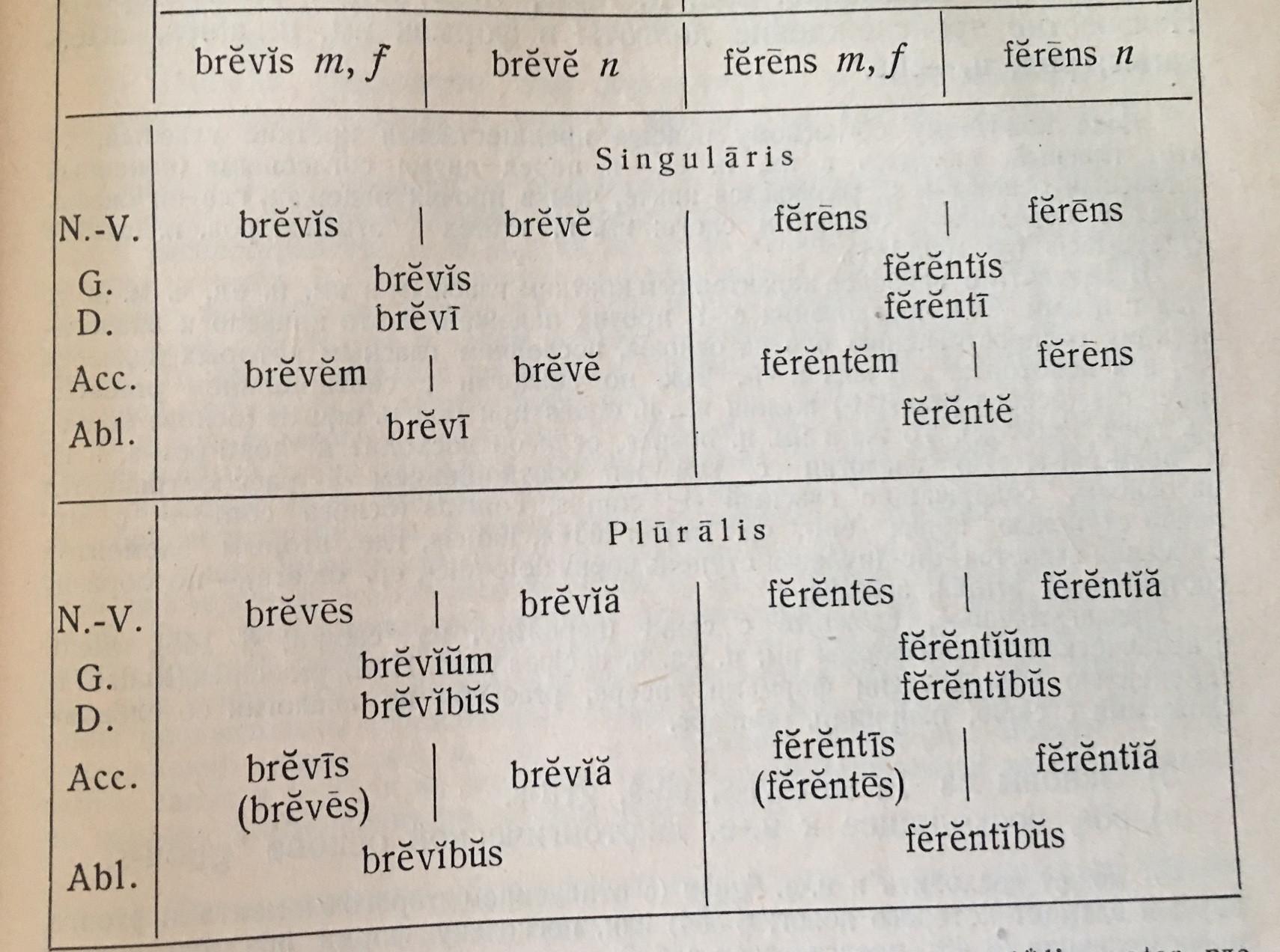In the famous line "quicquid id est timeo Danaos et dona ferentis" Vergilius uses an older plural accusative form ferentis instead of ferentes. (It is unimportant here whether quicquid or quidquid is used.) Is the i in the last syllable short or long, and how do we know? This particular case is the last syllable of a verse and therefore there is no metric constraint.
3 Answers
ACC.PL. is fĕrĕntīs.
The final syllable is superheavy, i.e. it consists of three morae.
FYI, the latest Teubner edition of Aeneis (Conte 2009) uses "ferentis", and so does Mynors 1969:
aut aliquis latet error: equo ne credite, Teucri.
quidqud id est, timeo Danaos et dona ferentis.’
sic fatus ualidis ingentem uiribus hastam
(II 48-50, p. 34)
And here's the complete paradigm (from Tronskii 1960, p. 155):
LHS (Leumann, Hofmann and Szantyr 1977) discuss this archaic form in section 357.C.3 (p. 440),
"Andrerseits als archaisierendes Kolorit etwa bei Vergil, und zwar nur dieses -īs auch bei i-Adjektiven und bei nt-Partizipien, so bei Vergil trīs, omnīs (substantiviert) und -entīs (can- fer- ru- sil - uws., sonantīs)."
- canentīs
- ferentīs
- ruentīs
- silentīs
- sonantīs
-
The du Pontet (OUP) edition of Caesar's Gallic wars opens with " Gallia est omnis divisa in partis tris", which comes as a shock to some traditionalists. Elsewhere in that edition we find the -es ending where -is might have been used. I can only regard the use of one ending or the other as idiosyncrasy on the part of whoever might be the editor. Commented Sep 29, 2016 at 16:06
-
1partis tris? God forbid. :) I will always remember it as "Gallia est omnis divisa in partes tres" (e.g. Hering).– Alex B.Commented Sep 29, 2016 at 16:12
-
3I'm not sure "superheavy" is a meaningful term in Latin prosody -- is there any evidence that such syllables were treated differently from other heavy syllables?– TKRCommented Sep 29, 2016 at 20:51
-
1@TKR well, it depends. If you're interested solely in Latin prosody (synchronic) then the term "superheavy" isn't that useful. If, however, you're more interested in comparative historical research, then yes, it is quite important.– Alex B.Commented Sep 30, 2016 at 3:14
-
I also learned it "in partes tres," and I will catch myself writing that from time to time, but I favor Du Pontet's OCT reading as well.– cmw ♦Commented May 29, 2021 at 3:39
It's definitely long, because the vowel of that i-stem acc. pl. ending, -īs, is always long, as any good grammar will tell you. (If the form was gen. sg., of course, it would be short, but that doesn't work in this line.)
This is so old a question, and this well-known line has so often been critically examined, that a definitive reply about the spelling appears out of the question. Wherever you consult a copy of the text you will find (mostly, I think) quidquid rather than quicquid, apparently at the whim of the editor or commentator. The same goes for ferentes/ferentis.
Given the host of imperfections in the Aeneid, I wonder if they really matter very much in this particular line? As for the scansion, of course we expect a hexameter to conclude with either a spondee or a trochee, and this is almost certainly the former. The rule is that final -es is long: there is a whole list of exceptions, but the nominative/accusative plural of a present participle isn't one of them. On the other hand final -is is generally short, though my old teacher insisted that its older use in the n/a plural has to be long: both -es and -is were certainly in use during the middle-to-late first century BC.
